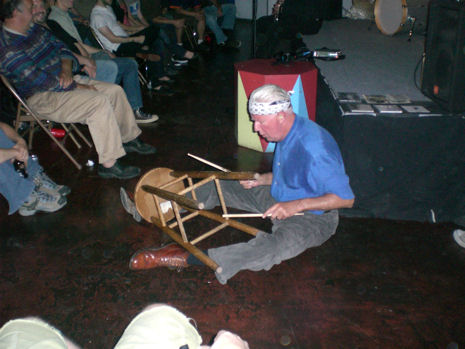
Peter Brotzmann's primal tenor saxophone howl is one of the most distinctive sounds in Free Jazz. Even alongside the manic spectacle of Bennink, it was seeing Brötzmann in person that forever indoctrinated me to his cause quite literally feeling the vibrations from his sax, and inhaling the smoke from his pipe.Pica Pica. Within the murky depths of a smoke-filled Butlins - yes, this was when you could still smoke indoors - their unplugged sax and drums abrasion espoused a sort of acoustic musical truth too easily overlooked by the reverb and amplifier worship permeating all neighbouring stages. I was a mere 17 at the time and in a weekend filled with epiphanies, Peter Brötzmann and Han Bennink's duel was by far writ starkest upon my fragile teenage mind. Brtzmann's assaultive 1968 octet recording set a precedent for all extreme improvised music that followed in its wake.brand new, still sealedPeter Brtzmann Octet Machine Gun - Alternate TakesLabel:CIEN FUEGOS CF021Format:Vinyl, LP, Reissue Country:AustriaReleased:27.The first and last time I saw Peter Brötzmann was at the Thurston Moore-curated Nightmare Before Christmas by ATP back in 2006. Envisioned and organized by infamous German tenor saxophonist Peter Brtzmann (nicknamed Machine Gun by trumpeter Don Cherry), Machine Gun provided a blueprint for such riotous ensembles as Last Exit, Naked City and Massacre.
The most defining characteristic of Brötzmann's playing - other than his infamously harsh tone - has always been the way in which the pieces come to life around him. Its spontaneity is what can initially draw a listener in, with the default praise for group improvisation being a congratulation of their 'telepathy' or 'chemistry'. This music is the purest kind, choosing to usurp notions such as pitch, rhythm or melody in the search for its sounds.

Hine Gun By Peter Brotzmann Full Force To
What's more, the mind-boggling table-top setup of the instrument makes the speed with which Adasiewicz's four sticks (two per hand) have to navigate the bars a show unto itself, the man occasionally staggering to maintain his balance. He has to literally raise his hands above his head and strike down at full force to push the bars up to the galling volumes called for by the piece's opening fanfare. Adasiewicz's instrument requires the sort of physicality one rarely sees in this or any music. The vibraphone adds potentially fleshy and soft textures of sustained and decaying sounds - bound to at most dominate and at least characterise proceedings.From the first starter's pistol blast of sax, the most striking elements of the show are, surprisingly, visual. Having all played with Brötzmann before, but never all at once, this quartet formation is still fresh. It was raw, unflinching and a journey for both musician and listener, in the truest possible sense.Restless as ever, Brötzmann's recent spell of collaborations have been some of his most satisfying since the 90s high watermarks of the Chicago Tentet and Die Like A Dog Quartet projects, and the trend continues during this two day residency at Cafe Oto, with two Brits - drummer Steve Noble and bassist John Edwards - and an Illinoisan - the inventive vibraphone master, Jason Adasiewicz.
One can't help but characterise the players, with Brötzmann as the group's tour guide through the depths of some asylum, Noble and Edwards closely following every word, while Adasiewicz set the piece's decidedly undecided tone. Brötzmann's ear-splitting opening statements ushering in a set of disjointed four-way conversation. It's a constant supplier of hanging notes that continually push any sign of cadence out of the quartet's reach.The first of the two nights' four sets is dominated by contemplation.
Edwards' furious bass solo is perhaps the most superhuman, although Adasiewicz's haphazard smashing and clawing at his vibraphone, literally lifting and dropping the bars to create cacophonous insanity, proves equally harrowing. Adasiewicz quickly blasts through a searing solo, coming across as more Bags' Groove than Machine Gun, and setting the tone for a set filled with instrumental pyrotechnics. The first night's second set is filled with bravado, harshly opposing the first's uncertain ambling. The first set's most harrowing moment is a tárogató and bowed bass duet with long held drones, while the percussionists reply with interleaving staccato runs.The improvisation during all four sets across both nights constantly progresses through the conversation between Brötzmann and Adasiewicz, and in Noble and Edwards' ability to prismatically explicate sounds to fit moods. In particular Edwards' dynamic ability to use every inch of his bass' vast dialect is quick to reflect and characterise any passage. The variety of sounds and techniques the quartet employ is stunning.
There's no circular breathing here (the man's a lifelong anti-technician). The ungodly ratatat of his quivering notes is so powerful because it is so tangibly real. Ultimately, this music is beyond accurate description, and in hindsight one's mind is left with little but the eternally gut-wrenching sound of Brötzmann's wailing.His reeds seem to reach right down and connect up to his vocal cords, a true extension of himself. This second night's high points are some of its most toe-curlingly manic, with Adasiewicz dropping his sticks entirely and grabbing with his hands, employing the squeak of an unoiled bar to mirror Brötzmann's explosive urgency in the second half. Steve Noble introduces actual signs of rhythm straight away, and drip feeds them in throughout both sets, the first of which is a contrasting patchwork of utter insanity with extended sections of almost hard bop normality, and the second a deeply menacing simulacrum of the apocalypse. A telling grin flashes across the master's face, and the show is over.While the first night is filled with abstraction and contemplation, the second is an evening of almost danceable blowouts.
This quartet is one of Brötzmann's most befitting lineups - the explorations being as much of a conversation as a battle - and 45 years since Machine Gun, this man's battle is still raging.


 0 kommentar(er)
0 kommentar(er)
